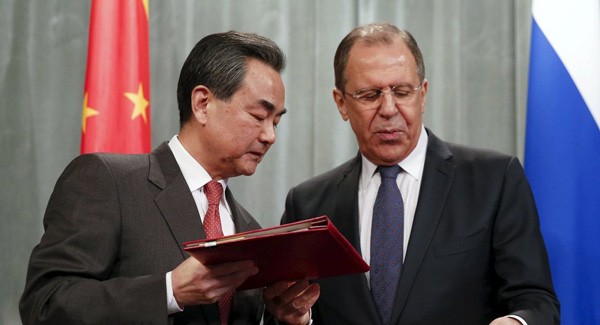Media Report

- The Washington Post reports: "Denouncing what they see as outside interference in the South China Sea and Korean Peninsula, the foreign ministers of Russia and China voiced mutual support Friday as they seek to counter the influence of Washington and its allies, particularly in Asia. Following talks in Beijing, Russia's Sergey Lavrov and China's Wang Yi expressed opposition to the U.S. deployment of an anti-missile system in South Korea and said non-claimants should not take sides in the dispute over maritime territorial claims in the South China Sea."
- Reuters reports: "China's securities regulator on Friday urged commodity futures exchanges to curb excessive speculation following a surge in prices that has sparked fears markets were heading for a dangerous boom-and-bust cycle. The China Securities Regulatory Commission (CSRC) said it would not allow the futures market to become a 'hot-bed' for speculators....The futures market should stick to its fundamental purpose of serving the real economy, and regulators will 'adamantly prevent the futures market from becoming a hotbed for short-term speculators,' the CSRC said in a statement on its official microblog. 'We will continue to guide the exchanges to take appropriate actions against excessive speculation and illegal behaviors,' the regulator said."
- The New York Times reports: "American leaders and interest groups have sharply criticized a new law in China aimed at controlling and limiting the work of foreign nongovernmental organizations in the country, saying it will lead to the deterioration of ties between the Chinese and people from abroad....'The United States is deeply concerned that China's new law on the management of foreign NGO activities will further narrow space for civil society in China and constrain contact between individuals and organizations in the United States and China,' the White House said in a statement on Thursday....The new law is to go into effect on Jan. 1. It will also apply to groups from Hong Kong, Macau and Taiwan."
Calendar
- 2016-04-28 China to join exercises with rival South China Sea claimants
- 2016-04-27 Storm clouds gather over South China Sea ahead of key U.N. ruling
- 2016-04-26 China Curbs Plans for More Coal-Fired Power Plants
- 2016-04-25 China Close to Passing Strict Law on Foreign Groups
- 2016-04-24 Earliest China Economic Data Show Recovery Gathers Pace in April
- 2016-04-22 China denies reports of massing troops at North Korea border
- 2016-04-21 US envoy says China, US united in opposition to NKorea tests
- 2016-04-20 Democrat attacks policy on China, Republican defends it
- 2016-04-19 China Extending Anti-Graft Measures to Officials' Families
- 2016-04-18 Chinese Housing Market Shakes Off a Slump
News
- The New York Times U.S. Denounces Chinese Law Restricting Foreign Organizations
- The Washington Post Russia, China in agreement on North Korea, South China Sea
- Reuters Exclusive: China securities regulator confirms order to curb futures speculation
- Bloomberg Business Russia Backs China's Challenges to U.S. Over Asian Flashpoints
- The Wall Street Journal U.S. Steel Accuses China of Hacking
- TIME China Campaigns Against 'Western Values,' but Does Beijing Really Think They're That Bad?
- The New York Times Clampdown in China Restricts 7,000 Foreign Organizations
- The Washington Post China vows to tackle 'family corruption' — but even state media can't hide its skepticism
- The Wall Street Journal China's New Tax Regime to Spur Service Economy
- Reuters China aims for manned moon landing by 2036
- The New York Times Aguilar Leads China Open 2nd Round When Play Suspended
- CNBC China intensifies lobbying of other nations ahead of South China Sea court ruling
- The Wall Street Journal Carl Icahn Says He No Longer Has Apple Stake, Citing China Concerns
Commentary
- The National Interest Xi's Free-Speech Pivot Echoes Mao
- The Diplomat China's Cultural Revolution at 50
- The Wall Street Journal Corruption Currents: China's Graft Fight Comes to TV
- The National Interest America's Navy Is Spread Too Thin
- Foreign Policy: Tea Leaf Nation The Man Who Burned His Chinese Passport
- The Wall Street Journal: China Real Time Chinese Rights Lawyer Strikes Back at ABA Over Scuttled Book
- The Diplomat China Quest for Clean Tech
